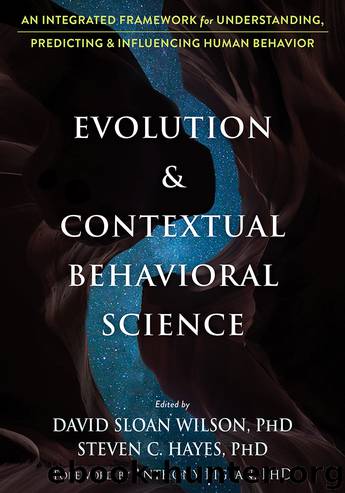Evolution and Contextual Behavioral Science by David Sloan Wilson

Author:David Sloan Wilson
Language: eng
Format: epub
Publisher: New Harbinger Publications
Published: 2018-08-21T17:39:27+00:00
Introduction
In this chapter, we explore how evolutionary theory can help managers guide organizational development—taking business firms as our main example. From an evolutionary perspective, that is, based on the explicit recognition that humans are a biological species with evolved behavioral dispositions, firms are best understood as historically and culturally specific solutions to the problem of achieving and sustaining large-scale cooperation among genetic strangers (Johnson, Price, & van Vugt, 2013; Stoelhorst & Richerson, 2013). This means that an understanding of the evolved dispositions that underlie the unique human ability to solve this problem should be helpful in successfully managing firms. This claim is in line with the recent suggestion that theories of, and attempts at, intentional change can benefit from being grounded in evolutionary theory (Wilson, Hayes, Biglan, & Embry, 2014).
In the management literature, the term “organizational development” refers broadly to the general phenomenon of organizational change, and more specifically to an approach to planned organizational change originating in the work of Kurt Lewin (Burnes & Cooke, 2012). Our view of organizational development bridges these two meanings of the term in the sense that we are concerned with organizational change in general, while focusing on the role of managers in planning this change. The explicit link from our arguments to the more specific approach to organizational development that emanated from Lewin’s work lies in his famous dictum: “There is nothing so practical as a good theory” (Lewin, 1951). Our main purpose is to show the practical relevance of evolutionary theory for an understanding of organizational change and development in modern firms.
Below, we use evolutionary theory to conceptualize firms as cultural contexts that allow their members to reap the benefits of large-scale cooperation. Standing in the way of these benefits are social dilemmas: situations involving tensions between (short-term) individual and (long-term) collective interests. From this perspective, management is about shaping the cultural context of a firm in ways that sustain cooperation in the face of social dilemmas. Managers can help sustain cooperation by appealing to psychological mechanisms that originally evolved to sustain cooperation in the small-scale and egalitarian societies in which humans originally evolved. Central among these mechanisms is how a firm’s members cognitively frame their social relationships with each other in terms of four elemental “relational models”: Communal Sharing, Authority Ranking, Equality Matching, and Market Pricing (Fiske, 1991, 1992). Managers can guide organizational development by influencing the specific combination of relational models that the members of a firm adopt to structure their social interactions. Managers exert this influence through their leadership style (managers lead in part by example) and their power to change formal rules (managers lead in part by organization design). We give examples of each.
Modern Organizations from an Evolutionary Perspective
In the context of evolutionary theory, modern organizations such as firms are puzzling phenomena because they typically involve very large scale cooperation among individuals who are not directly related genetically. Cooperation in general, not to mention the human ability to sustain large-scale cooperation among non-kin, seems to fly in the
Download
This site does not store any files on its server. We only index and link to content provided by other sites. Please contact the content providers to delete copyright contents if any and email us, we'll remove relevant links or contents immediately.
Rewire Your Anxious Brain by Catherine M. Pittman(18630)
Talking to Strangers by Malcolm Gladwell(13338)
The Art of Thinking Clearly by Rolf Dobelli(10406)
Mindhunter: Inside the FBI's Elite Serial Crime Unit by John E. Douglas & Mark Olshaker(9308)
Becoming Supernatural by Dr. Joe Dispenza(8194)
Change Your Questions, Change Your Life by Marilee Adams(7730)
Nudge - Improving Decisions about Health, Wealth, and Happiness by Thaler Sunstein(7687)
The Road Less Traveled by M. Scott Peck(7581)
The Lost Art of Listening by Michael P. Nichols(7485)
Mastermind: How to Think Like Sherlock Holmes by Maria Konnikova(7312)
Enlightenment Now: The Case for Reason, Science, Humanism, and Progress by Steven Pinker(7303)
Win Bigly by Scott Adams(7181)
The Way of Zen by Alan W. Watts(6589)
Daring Greatly by Brene Brown(6500)
Big Magic: Creative Living Beyond Fear by Elizabeth Gilbert(5739)
Grit by Angela Duckworth(5591)
Ego Is the Enemy by Ryan Holiday(5406)
Men In Love by Nancy Friday(5225)
The Laws of Human Nature by Robert Greene(5153)
